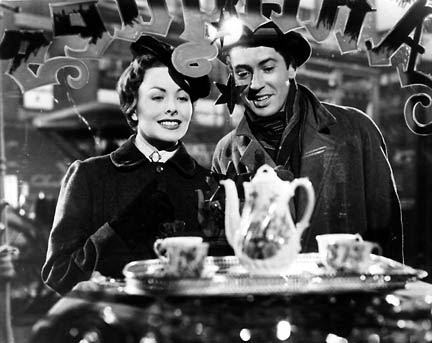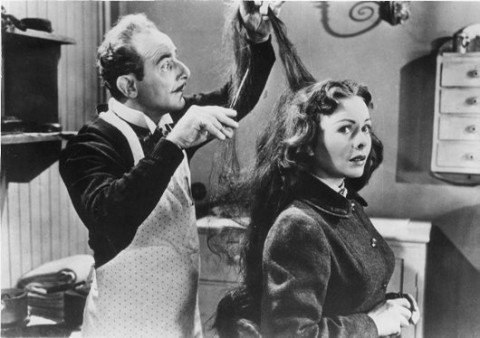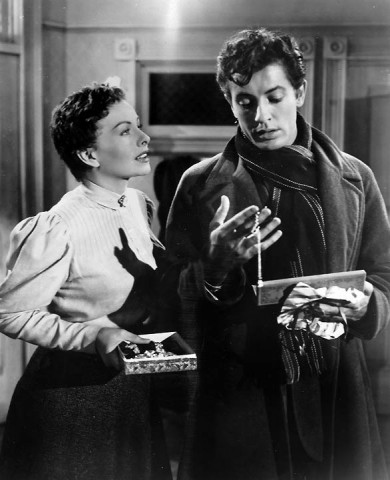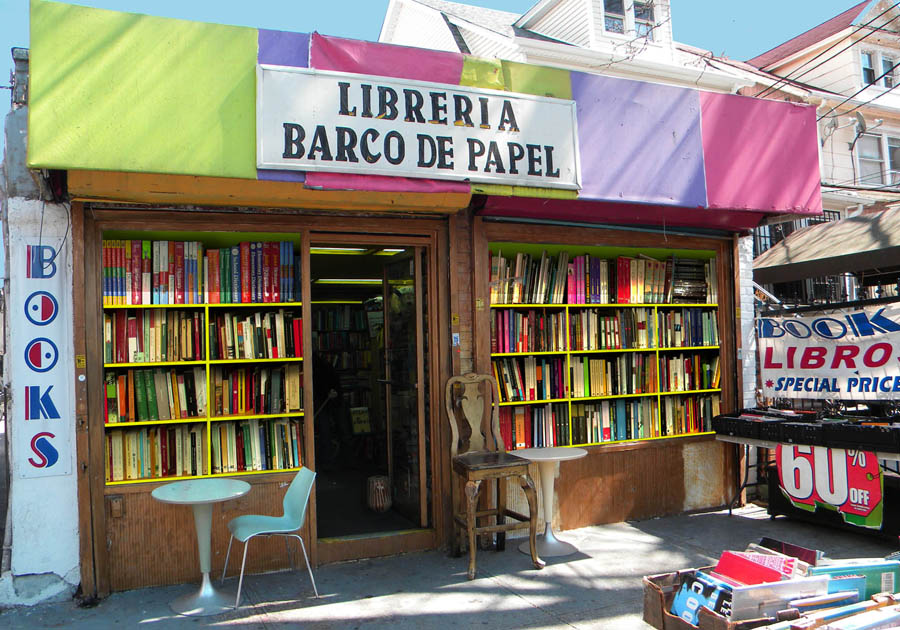
Original version in English at the end of the page.
Un dólar y ochenta y siete centavos. Eso era todo. Y setenta centavos estaban en céntimos. Céntimos ahorrados, uno por uno, discutiendo con el almacenero y el verdulero y el carnicero hasta que las mejillas de uno se ponían rojas de vergüenza ante la silenciosa acusación de avaricia que implicaba un regateo tan obstinado. Delia los contó tres veces. Un dólar y ochenta y siete centavos. Y al día siguiente era Navidad.
Evidentemente no había nada que hacer fuera de echarse al miserable lecho y llorar. Y Delia lo hizo. Lo que conduce a la reflexión moral de que la vida se compone de sollozos, lloriqueos y sonrisas, con predominio de los lloriqueos.
Mientras la dueña de casa se va calmando, pasando de la primera a la segunda etapa, echemos una mirada a su hogar, uno de esos departamentos de ocho dólares a la semana. No era exactamente un lugar para alojar mendigos, pero ciertamente la policía lo habría descrito como tal.
Abajo, en la entrada, había un buzón al cual no llegaba carta alguna, Y un timbre eléctrico al cual no se acercaría jamás un dedo mortal. También pertenecía al departamento una tarjeta con el nombre de «Señor James Dillingham Young».
La palabra «Dillingham» había llegado hasta allí volando en la brisa de un anterior período de prosperidad de su dueño, cuando ganaba treinta dólares semanales. Pero ahora que sus entradas habían bajado a veinte dólares, las letras de «Dillingham» se veían borrosas, como si estuvieran pensando seriamente en reducirse a una modesta y humilde «D». Pero cuando el señor James Dillingham Young llegaba a su casa y subía a su departamento, le decían «Jim» y era cariñosamente abrazado por la señora Delia Dillingham Young, a quien hemos presentado al lector como Delia. Todo lo cual está muy bien.
Delia dejó de llorar y se empolvó las mejillas con el cisne de plumas. Se quedó de pie junto a la ventana y miró hacia afuera, apenada, y vio un gato gris que caminaba sobre una verja gris en un patio gris. Al día siguiente era Navidad y ella tenía solamente un dólar y ochenta y siete centavos para comprarle un regalo a Jim. Había estado ahorrando cada centavo, mes a mes, y éste era el resultado. Con veinte dólares a la semana no se va muy lejos. Los gastos habían sido mayores de lo que había calculado. Siempre lo eran. Sólo un dólar con ochenta y siete centavos para comprar un regalo a Jim. Su Jim. Había pasado muchas horas felices imaginando algo bonito para él. Algo fino y especial y de calidad -algo que tuviera justamente ese mínimo de condiciones para que fuera digno de pertenecer a Jim. Entre las ventanas de la habitación había un espejo de cuerpo entero. Quizás alguna vez hayan visto ustedes un espejo de cuerpo entero en un departamento de ocho dólares. Una persona muy delgada y ágil podría, al mirarse en él, tener su imagen rápida y en franjas longitudinales. Como Delia era esbelta, lo hacía con absoluto dominio técnico. De repente se alejó de la ventana y se paró ante el espejo. Sus ojos brillaban intensamente, pero su rostro perdió su color antes de veinte segundos. Soltó con urgencia sus cabellera y la dejó caer cuan larga era.
Los Dillingham eran dueños de dos cosas que les provocaban un inmenso orgullo. Una era el reloj de oro que había sido del padre de Jim y antes de su abuelo. La otra era la cabellera de Delia. Si la Reina de Saba hubiera vivido en el departamento frente al suyo, algún día Delia habría dejado colgar su cabellera fuera de la ventana nada más que para demostrar su desprecio por las joyas y los regalos de Su Majestad. Si el rey Salomón hubiera sido el portero, con todos sus tesoros apilados en el sótano, Jim hubiera sacado su reloj cada vez que hubiera pasado delante de él nada más que para verlo mesándose su barba de envidia.
La hermosa cabellera de Delia cayó sobre sus hombros y brilló como una cascada de pardas aguas. Llegó hasta más abajo de sus rodillas y la envolvió como una vestidura. Y entonces ella la recogió de nuevo, nerviosa y rápidamente. Por un minuto se sintió desfallecer y permaneció de pie mientras un par de lágrimas caían a la raída alfombra roja.
Se puso su vieja y oscura chaqueta; se puso su viejo sombrero. Con un revuelo de faldas y con el brillo todavía en los ojos, abrió nerviosamente la puerta, salió y bajó las escaleras para salir a la calle.
Donde se detuvo se leía un cartel: «Mme. Sofronie. Cabellos de todas clases». Delia subió rápidamente Y, jadeando, trató de controlarse. Madame, grande, demasiado blanca, fría, no parecía la «Sofronie» indicada en la puerta.
-¿Quiere comprar mi pelo? -preguntó Delia.
-Compro pelo -dijo Madame-. Sáquese el sombrero y déjeme mirar el suyo.
La áurea cascada cayó libremente.
-Veinte dólares -dijo Madame, sopesando la masa con manos expertas.
-Démelos inmediatamente -dijo Delia.
Oh, y las dos horas siguientes transcurrieron volando en alas rosadas. Perdón por la metáfora, tan vulgar. Y Delia empezó a mirar los negocios en busca del regalo para Jim.
 Al fin lo encontró. Estaba hecho para Jim, para nadie más. En ningún negocio había otro regalo como ése. Y ella los había inspeccionado todos. Era una cadena de reloj, de platino, de diseño sencillo y puro, que proclamaba su valor sólo por el material mismo y no por alguna ornamentación inútil y de mal gusto… tal como ocurre siempre con las cosas de verdadero valor. Era digna del reloj. Apenas la vio se dio cuenta de que era exactamente lo que buscaba para Jim. Era como Jim: valioso y sin aspavientos. La descripción podía aplicarse a ambos. Pagó por ella veintiún dólares y regresó rápidamente a casa con ochenta y siete centavos. Con esa cadena en su reloj, Jim iba a vivir ansioso de mirar la hora en compañía de cualquiera. Porque, aunque el reloj era estupendo, Jim se veía obligado a mirar la hora a hurtadillas a causa de la gastada correa que usaba en vez de una cadena.
Al fin lo encontró. Estaba hecho para Jim, para nadie más. En ningún negocio había otro regalo como ése. Y ella los había inspeccionado todos. Era una cadena de reloj, de platino, de diseño sencillo y puro, que proclamaba su valor sólo por el material mismo y no por alguna ornamentación inútil y de mal gusto… tal como ocurre siempre con las cosas de verdadero valor. Era digna del reloj. Apenas la vio se dio cuenta de que era exactamente lo que buscaba para Jim. Era como Jim: valioso y sin aspavientos. La descripción podía aplicarse a ambos. Pagó por ella veintiún dólares y regresó rápidamente a casa con ochenta y siete centavos. Con esa cadena en su reloj, Jim iba a vivir ansioso de mirar la hora en compañía de cualquiera. Porque, aunque el reloj era estupendo, Jim se veía obligado a mirar la hora a hurtadillas a causa de la gastada correa que usaba en vez de una cadena.
Cuando Delia llegó a casa, su excitación cedió el paso a una cierta prudencia y sensatez. Sacó sus tenacillas para el pelo, encendió el gas y empezó a reparar los estragos hechos por la generosidad sumada al amor. Lo cual es una tarea tremenda, amigos míos, una tarea gigantesca.
A los cuarenta minutos su cabeza estaba cubierta por unos rizos pequeños y apretados que la hacían parecerse a un encantador estudiante holgazán. Miró su imagen en el espejo con ojos críticos, largamente.
«Si Jim no me mata, se dijo, antes de que me mire por segunda vez, dirá que parezco una corista de Coney Island. Pero, ¿qué otra cosa podría haber hecho? ¡Oh! ¿Qué podría haber hecho con un dólar y ochenta y siete centavos?.»
A las siete de la noche el café estaba ya preparado y la sartén lista en la estufa para recibir la carne.
Jim no se retrasaba nunca. Delia apretó la cadena en su mano y se sentó en la punta de la mesa que quedaba cerca de la puerta por donde Jim entraba siempre. Entonces escuchó sus pasos en el primer rellano de la escalera y, por un momento, se puso pálida. Tenía la costumbre de decir pequeñas plegarias por las pequeñas cosas cotidianas y ahora murmuró: «Dios mío, que Jim piense que sigo siendo bonita».
La puerta se abrió, Jim entró y la cerró. Se le veía delgado y serio. Pobre muchacho, sólo tenía veintidós años y ¡ya con una familia que mantener! Necesitaba evidentemente un abrigo nuevo y no tenía guantes.
Jim franqueó el umbral y allí permaneció inmóvil como un perdiguero que ha descubierto una codorniz. Sus ojos se fijaron en Delia con una expresión que su mujer no pudo interpretar, pero que la aterró. No era de enojo ni de sorpresa ni de desaprobación ni de horror ni de ningún otro sentimiento para los que que ella hubiera estado preparada. Él la miraba simplemente, con fijeza, con una expresión extraña.
Delia se levantó nerviosamente y se acercó a él.
-Jim, querido -exclamó- no me mires así. Me corté el pelo y lo vendí porque no podía pasar la Navidad sin hacerte un regalo. Crecerá de nuevo ¿no te importa, verdad? No podía dejar de hacerlo. Mi pelo crece rápidamente. Dime «Feliz Navidad» y seamos felices. ¡No te imaginas qué regalo, qué regalo tan lindo te tengo!
-¿Te cortaste el pelo? -preguntó Jim, con gran trabajo, como si no pudiera darse cuenta de un hecho tan evidente aunque hiciera un enorme esfuerzo mental.
-Me lo corté y lo vendí -dijo Delia-. De todos modos te gusto lo mismo, ¿no es cierto? Sigo siendo la misma aún sin mi pelo, ¿no es así?
Jim pasó su mirada por la habitación con curiosidad.
-¿Dices que tu pelo ha desaparecido? -dijo con aire casi idiota.
-No pierdas el tiempo buscándolo -dijo Delia-. Lo vendí, ya te lo dije, lo vendí, eso es todo. Es Nochebuena, muchacho. Lo hice por ti, perdóname. Quizás alguien podría haber contado mi pelo, uno por uno -continuó con una súbita y seria dulzura-, pero nadie podría haber contado mi amor por ti. ¿Pongo la carne al fuego? -preguntó.
Pasada la primera sorpresa, Jim pareció despertar rápidamente. Abrazó a Delia. Durante diez segundos miremos con discreción en otra dirección, hacia algún objeto sin importancia. Ocho dólares a la semana o un millón en un año, ¿cuál es la diferencia? Un matemático o algún hombre sabio podrían darnos una respuesta equivocada. Los Reyes Magos trajeron al Niño regalos de gran valor, pero aquél no estaba entre ellos. Este oscuro acertijo será explicado más adelante.
Jim sacó un paquete del bolsillo de su abrigo y lo puso sobre la mesa.
-No te equivoques conmigo, Delia -dijo-. Ningún corte de pelo, o su lavado o un peinado especial, harían que yo quisiera menos a mi mujercita. Pero si abres ese paquete verás por qué me has provocado tal desconcierto en un primer momento.
Los blancos y ágiles dedos de Delia retiraron el papel y la cinta. Y entonces se escuchó un jubiloso grito de éxtasis; y después, ¡ay!, un rápido y femenino cambio hacia un histérico raudal de lágrimas y de gemidos, lo que requirió el inmediato despliegue de todos los poderes de consuelo del señor del departamento.
Porque allí estaban las peinetas -el juego completo de peinetas, una al lado de otra- que Delia había estado admirando durante mucho tiempo en una vitrina de Broadway. Eran unas peinetas muy hermosas, de carey auténtico, con sus bordes adornados con joyas y justamente del color para lucir en la bella cabellera ahora desaparecida. Eran peinetas muy caras, ella lo sabía, y su corazón simplemente había suspirado por ellas y las había anhelado sin la menor esperanza de poseerlas algún día. Y ahora eran suyas, pero las trenzas destinadas a ser adornadas con esos codiciados adornos habían desaparecido.
Pero Delia las oprimió contra su pecho y, finalmente, fue capaz de mirarlas con ojos húmedos y con una débil sonrisa, y dijo:
-¡Mi pelo crecerá muy rápido, Jim!
Y enseguida dio un salto como un gatito chamuscado y gritó:
-¡Oh, oh!
Jim no había visto aún su hermoso regalo. Delia lo mostró con vehemencia en la abierta palma de su mano. El precioso y opaco metal pareció brillar con la luz del brillante y ardiente espíritu de Delia.
-¿Verdad que es maravillosa, Jim? Recorrí la ciudad entera para encontrarla. Ahora podrás mirar la hora cien veces al día si se te antoja. Dame tu reloj. Quiero ver cómo se ve con ella puesta.
En vez de obedecer, Jim se dejo caer en el sofá, cruzó sus manos debajo de su nuca y sonrió.
-Delia -le dijo- olvidémonos de nuestros regalos de Navidad por ahora. Son demasiado hermosos para usarlos en este momento. Vendí mi reloj para comprarte las peinetas. Y ahora pon la carne al fuego.
 Los Reyes Magos, como ustedes seguramente saben, eran muy sabios -maravillosamente sabios- y llevaron regalos al Niño en el Pesebre. Ellos fueron los que inventaron los regalos de Navidad. Como eran sabios, no hay duda que también sus regalos lo eran, con la ventaja suplementaria, además, de poder ser cambiados en caso de estar repetidos. Y aquí les he contado, en forma muy torpe, la sencilla historia de dos jóvenes atolondrados que vivían en un departamento y que insensatamente sacrificaron el uno al otro los más ricos tesoros que tenían en su casa. Pero, para terminar, digamos a los sabios de hoy en día que, de todos los que hacen regalos, ellos fueron los más sabios. De todos los que dan y reciben regalos, los más sabios son los seres como Jim y Delia. Ellos son los verdaderos Reyes Magos.
Los Reyes Magos, como ustedes seguramente saben, eran muy sabios -maravillosamente sabios- y llevaron regalos al Niño en el Pesebre. Ellos fueron los que inventaron los regalos de Navidad. Como eran sabios, no hay duda que también sus regalos lo eran, con la ventaja suplementaria, además, de poder ser cambiados en caso de estar repetidos. Y aquí les he contado, en forma muy torpe, la sencilla historia de dos jóvenes atolondrados que vivían en un departamento y que insensatamente sacrificaron el uno al otro los más ricos tesoros que tenían en su casa. Pero, para terminar, digamos a los sabios de hoy en día que, de todos los que hacen regalos, ellos fueron los más sabios. De todos los que dan y reciben regalos, los más sabios son los seres como Jim y Delia. Ellos son los verdaderos Reyes Magos.
FIN
https://www.youtube.com/watch?v=0rpDP0ciGj8&feature=youtu.be
The Gift of the Magi by O. Herny
One dollar and eighty-seven cents. That was all. And sixty cents of it was in pennies. Pennies saved one and two at a time by bulldozing the grocer and the vegetable man and the butcher until one’s cheeks burned with the silent imputation of parsimony that such close dealing implied. Three times Della counted it. One dollar and eighty- seven cents. And the next day would be Christmas.
There was clearly nothing to do but flop down on the shabby little couch and howl. So Della did it. Which instigates the moral reflection that life is made up of sobs, sniffles, and smiles, with sniffles predominating.
While the mistress of the home is gradually subsiding from the first stage to the second, take a look at the home. A furnished flat at $8 per week. It did not exactly beggar description, but it certainly had that word on the lookout for the mendicancy squad.
In the vestibule below was a letter-box into which no letter would go, and an electric button from which no mortal finger could coax a ring. Also appertaining thereunto was a card bearing the name «Mr. James Dillingham Young.»
The «Dillingham» had been flung to the breeze during a former period of prosperity when its possessor was being paid $30 per week. Now, when the income was shrunk to $20, though, they were thinking seriously of contracting to a modest and unassuming D. But whenever Mr. James Dillingham Young came home and reached his flat above he was called «Jim» and greatly hugged by Mrs. James Dillingham Young, already introduced to you as Della. Which is all very good.
Della finished her cry and attended to her cheeks with the powder rag. She stood by the window and looked out dully at a gray cat walking a gray fence in a gray backyard. Tomorrow would be Christmas Day, and she had only $1.87 with which to buy Jim a present. She had been saving every penny she could for months, with this result. Twenty dollars a week doesn’t go far. Expenses had been greater than she had calculated. They always are. Only $1.87 to buy a present for Jim. Her Jim. Many a happy hour she had spent planning for something nice for him. Something fine and rare and sterling–something just a little bit near to being worthy of the honor of being owned by Jim.
There was a pier-glass between the windows of the room. Perhaps you have seen a pier-glass in an $8 flat. A very thin and very agile person may, by observing his reflection in a rapid sequence of longitudinal strips, obtain a fairly accurate conception of his looks. Della, being slender, had mastered the art.
Suddenly she whirled from the window and stood before the glass. her eyes were shining brilliantly, but her face had lost its color within twenty seconds. Rapidly she pulled down her hair and let it fall to its full length.
Now, there were two possessions of the James Dillingham Youngs in which they both took a mighty pride. One was Jim’s gold watch that had been his father’s and his grandfather’s. The other was Della’s hair. Had the queen of Sheba lived in the flat across the airshaft, Della would have let her hair hang out the window some day to dry just to depreciate Her Majesty’s jewels and gifts. Had King Solomon been the janitor, with all his treasures piled up in the basement, Jim would have pulled out his watch every time he passed, just to see him pluck at his beard from envy.
So now Della’s beautiful hair fell about her rippling and shining like a cascade of brown waters. It reached below her knee and made itself almost a garment for her. And then she did it up again nervously and quickly. Once she faltered for a minute and stood still while a tear or two splashed on the worn red carpet.
On went her old brown jacket; on went her old brown hat. With a whirl of skirts and with the brilliant sparkle still in her eyes, she fluttered out the door and down the stairs to the street.
Where she stopped the sign read: «Mne. Sofronie. Hair Goods of All Kinds.» One flight up Della ran, and collected herself, panting. Madame, large, too white, chilly, hardly looked the «Sofronie.»
«Will you buy my hair?» asked Della.
«I buy hair,» said Madame. «Take yer hat off and let’s have a sight at the looks of it.»
Down rippled the brown cascade.
«Twenty dollars,» said Madame, lifting the mass with a practised hand.
«Give it to me quick,» said Della.
Oh, and the next two hours tripped by on rosy wings. Forget the hashed metaphor. She was ransacking the stores for Jim’s present.
She found it at last. It surely had been made for Jim and no one else. There was no other like it in any of the stores, and she had turned all of them inside out. It was a platinum fob chain simple and chaste in design, properly proclaiming its value by substance alone and not by meretricious ornamentation–as all good things should do. It was even worthy of The Watch. As soon as she saw it she knew that it must be Jim’s. It was like him. Quietness and value–the description applied to both. Twenty-one dollars they took from her for it, and she hurried home with the 87 cents. With that chain on his watch Jim might be properly anxious about the time in any company. Grand as the watch was, he sometimes looked at it on the sly on account of the old leather strap that he used in place of a chain.
When Della reached home her intoxication gave way a little to prudence and reason. She got out her curling irons and lighted the gas and went to work repairing the ravages made by generosity added to love. Which is always a tremendous task, dear friends–a mammoth task.
Within forty minutes her head was covered with tiny, close-lying curls that made her look wonderfully like a truant schoolboy. She looked at her reflection in the mirror long, carefully, and critically.
«If Jim doesn’t kill me,» she said to herself, «before he takes a second look at me, he’ll say I look like a Coney Island chorus girl. But what could I do–oh! what could I do with a dollar and eighty- seven cents?»
At 7 o’clock the coffee was made and the frying-pan was on the back of the stove hot and ready to cook the chops.
Jim was never late. Della doubled the fob chain in her hand and sat on the corner of the table near the door that he always entered. Then she heard his step on the stair away down on the first flight, and she turned white for just a moment. She had a habit for saying little silent prayer about the simplest everyday things, and now she whispered: «Please God, make him think I am still pretty.»
The door opened and Jim stepped in and closed it. He looked thin and very serious. Poor fellow, he was only twenty-two–and to be burdened with a family! He needed a new overcoat and he was without gloves.
Jim stopped inside the door, as immovable as a setter at the scent of quail. His eyes were fixed upon Della, and there was an expression in them that she could not read, and it terrified her. It was not anger, nor surprise, nor disapproval, nor horror, nor any of the sentiments that she had been prepared for. He simply stared at her fixedly with that peculiar expression on his face.
Della wriggled off the table and went for him
«Jim, darling,» she cried, «don’t look at me that way. I had my hair cut off and sold because I couldn’t have lived through Christmas without giving you a present. It’ll grow out again–you won’t mind, will you? I just had to do it. My hair grows awfully fast. Say `Merry Christmas!’ Jim, and let’s be happy. You don’t know what a nice– what a beautiful, nice gift I’ve got for you.»
«You’ve cut off your hair?» asked Jim, laboriously, as if he had not arrived at that patent fact yet even after the hardest mental labor.
«Cut it off and sold it,» said Della. «Don’t you like me just as well, anyhow? I’m me without my hair, ain’t I?»
Jim looked about the room curiously.
«You say your hair is gone?» he said, with an air almost of idiocy.
«You needn’t look for it,» said Della. «It’s sold, I tell you–sold and gone, too. It’s Christmas Eve, boy. Be good to me, for it went for you. Maybe the hairs of my head were numbered,» she went on with sudden serious sweetness, «but nobody could ever count my love for you. Shall I put the chops on, Jim?»
Out of his trance Jim seemed quickly to wake. He enfolded his Della. For ten seconds let us regard with discreet scrutiny some inconsequential object in the other direction. Eight dollars a week or a million a year–what is the difference? A mathematician or a wit would give you the wrong answer. The magi brought valuable gifts, but that was not among them. This dark assertion will be illuminated later on.
Jim drew a package from his overcoat pocket and threw it upon the table
«Don’t make any mistake, Dell,» he said, «about me. I don’t think there’s anything in the way of a haircut or a shave or a shampoo that could make me like my girl any less. But if you’ll unwrap that package you may see why you had me going a while at first.»
White fingers and nimble tore at the string and paper. And then an ecstatic scream of joy; and then, alas! a quick feminine change to hysterical tears and wails, necessitating the immediate employment of all the comforting powers of the lord of the flat.
For there lay The Combs–the set of combs, side and back, that Della had worshipped long in a Broadway window. Beautiful combs, pure tortoise shell, with jewelled rims–just the shade to wear in the beautiful vanished hair. They were expensive combs, she knew, and her heart had simply craved and yearned over them without the least hope of possession. And now, they were hers, but the tresses that should have adorned the coveted adornments were gone.
But she hugged them to her bosom, and at length she was able to look up with dim eyes and a smile and say: «My hair grows so fast, Jim!»
And them Della leaped up like a little singed cat and cried, «Oh, oh!»
Jim had not yet seen his beautiful present. She held it out to him eagerly upon her open palm. The dull precious metal seemed to flash with a reflection of her bright and ardent spirit.
«Isn’t it a dandy, Jim? I hunted all over town to find it. You’ll have to look at the time a hundred times a day now. Give me your watch. I want to see how it looks on it.»
Instead of obeying, Jim tumbled down on the couch and put his hands under the back of his head and smiled.
«Dell,» said he, «let’s put our Christmas presents away and keep ‘em a while. They’re too nice to use just at present. I sold the watch to get the money to buy your combs. And now suppose you put the chops on.
The magi, as you know, were wise men–wonderfully wise men–who brought gifts to the Babe in the manger. They invented the art of giving Christmas presents. Being wise, their gifts were no doubt wise ones, possibly bearing the privilege of exchange in case of duplication. And here I have lamely related to you the uneventful chronicle of two foolish children in a flat who most unwisely sacrificed for each other the greatest treasures of their house. But in a last word to the wise of these days let it be said that of all who give gifts these two were the wisest. O all who give and receive gifts, such as they are wisest. Everywhere they are wisest. They are the magi.


